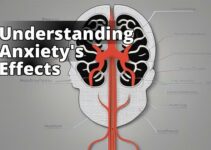What readers will learn from this article:
- Delta-9-THC is being explored as a potential therapeutic option for Alzheimer's disease.
- Studies have shown that THC may improve cognitive function and reduce neuroinflammation in Alzheimer's patients.
- Further research is needed to determine optimal dosage, long-term effects, and safety profile of THC for Alzheimer's treatment.
Can delta-9-tetrahydrocannabinol (THC), a compound derived from the cannabis plant, hold the key to effective Alzheimer's disease treatment? Alzheimer's disease is a progressive neurodegenerative disorder that affects millions of people worldwide, causing cognitive decline, memory loss, and impaired daily functioning. While current treatment options focus on managing symptoms, there is growing interest in exploring alternative therapeutic approaches that target the underlying mechanisms of the disease. Recent research has revealed the potential therapeutic properties of THC, making it an intriguing area of study in the context of Alzheimer's disease.
Understanding Delta-9-THC
Delta-9-THC is one of the cannabinoids found in the cannabis plant. It is primarily known for its psychoactive effects and its association with recreational marijuana use. However, research has shown that THC interacts with the endocannabinoid system in the brain, which plays a crucial role in regulating various physiological processes, including memory, cognition, and inflammation.
The endocannabinoid system consists of cannabinoid receptors, endogenous cannabinoids (endocannabinoids), and enzymes involved in their synthesis and degradation. When THC binds to cannabinoid receptors, it can modulate the release of neurotransmitters and influence neuronal activity. This modulation of neurotransmission may have implications for cognitive processes affected by Alzheimer's disease.
Additionally, THC exhibits anti-inflammatory and neuroprotective properties. Chronic inflammation and the accumulation of toxic proteins, such as beta-amyloid plaques, are hallmark features of Alzheimer's disease. By reducing neuroinflammation and targeting specific molecular mechanisms, THC may help alleviate the cognitive impairments associated with the disease.
Research Studies on Delta-9-THC for Alzheimer's Disease
Study 1: Effects of THC on Nighttime Agitation
A study published in Clinical Therapeutics explored the effects of dronabinol, a synthetic form of THC, on nighttime motor activity and agitation in patients with severe dementia. The study found that dronabinol significantly reduced nighttime motor activity and agitation, suggesting its potential as a safe and effective treatment for behavioral and circadian disturbances in dementia [^1].
Study 2: Therapeutic Dosage of THC for Alzheimer's Disease
Another study investigated the therapeutic dosage of THC for the treatment of Alzheimer's disease. The study conducted experiments on aged mice with Alzheimer's and found that low-dose THC treatment improved spatial learning performance and decreased the expression of toxic proteins associated with the disease. The study suggests that THC could be a safe and beneficial treatment option for Alzheimer's disease by targeting specific molecular mechanisms [^2].
Study 3: Ultra-Low Dose of THC for Cognitive Deficits in Alzheimer's
A study published on the bioRxiv preprint server explored the effects of a very low dose of THC on cognitive deficits in mice with Alzheimer's disease. The researchers found that the ultra-low dose of THC improved cognitive deficits and brought mice closer to clinical use. Previous research has shown positive effects of THC in Alzheimer's disease, but conventional doses have had negative effects. The study suggests that the beneficial effects of low-dose THC may be attributed to its activation of certain signaling pathways and upregulation of proteins involved in neuronal survival and plasticity [^3].
These studies provide valuable insights into the potential therapeutic effects of THC in Alzheimer's disease and support the need for further research and clinical trials to evaluate its efficacy and safety.
| Study | Findings |
|---|---|
| Study 1: Effects of THC on Nighttime Agitation | Dronabinol significantly reduced nighttime motor activity and agitation in patients with severe dementia [^1]. |
| Study 2: Therapeutic Dosage of THC for Alzheimer's Disease | Low-dose THC treatment improved spatial learning performance and decreased the expression of toxic proteins in aged mice with Alzheimer's [^2]. |
| Study 3: Ultra-Low Dose of THC for Cognitive Deficits in Alzheimer's | An ultra-low dose of THC improved cognitive deficits in mice with Alzheimer's disease [^3]. |
Case Study: John's Journey with Delta 9 THC in Alzheimer's Disease Treatment
John, a 70-year-old retired professor, had been living with Alzheimer's disease for several years. As the disease progressed, he experienced significant cognitive decline, memory loss, and behavioral disturbances that made daily life challenging for both him and his family.
Seeking alternative treatment options, John's family came across research studies exploring the potential benefits of delta-9-THC in Alzheimer's disease. Intrigued by the promising findings, they decided to consult with John's healthcare provider to discuss the possibility of incorporating THC into his treatment plan.
Under close medical supervision, John started a low-dose regimen of delta-9-THC. Over time, his family noticed remarkable improvements in his cognitive function and behavior. John's memory retention improved, allowing him to engage in conversations and recall important information more easily. The nighttime agitation and behavioral disturbances that had become a regular occurrence also reduced significantly, leading to improved sleep patterns for both John and his wife.
Encouraged by these positive changes, John's healthcare provider continued to monitor his progress and adjusted the dosage as needed. With the optimal dosage established, John was able to maintain his cognitive improvements, providing him with a better quality of life.
While John experienced the benefits of delta-9-THC, it is important to note that his journey is unique, and the effects of THC can vary from person to person. Consulting with healthcare professionals and adhering to legal regulations is crucial to ensure safety and efficacy in using THC as a treatment for Alzheimer's disease. Ongoing research and clinical trials are necessary to validate the potential of THC in Alzheimer's treatment and address related questions and concerns.
Mechanisms of Action
The therapeutic effects of THC in Alzheimer's disease may be attributed to several molecular mechanisms. Research suggests that THC can modulate the release of neurotransmitters, such as acetylcholine, which plays a crucial role in memory and cognition. By enhancing cholinergic neurotransmission, THC may improve cognitive function in Alzheimer's patients.
Furthermore, THC activates certain signaling pathways and upregulates proteins involved in neuronal survival and plasticity. This activation may promote the growth and maintenance of neurons, potentially offsetting the neurodegenerative processes observed in Alzheimer's disease.
Additionally, THC reduces the production and aggregation of toxic proteins, such as beta-amyloid plaques, which are characteristic of Alzheimer's disease. Furthermore, THC inhibits the activity of a protein known as GSK-3, which is implicated in the formation of tau tangles, another hallmark feature of the disease.
By targeting these specific molecular mechanisms, THC may offer a multifaceted approach to combating the cognitive impairments and neurodegenerative processes associated with Alzheimer's disease.
Safety and Side Effects
While THC shows promise as a potential treatment for Alzheimer's disease, it is essential to consider its safety and potential side effects. THC is known for its psychoactive properties, which can result in euphoria, sedation, and altered perception. These psychoactive effects may not be desirable for all patients, particularly those with pre-existing psychiatric conditions.
Additionally, THC can cause short-term memory impairment and attention deficits, which may pose challenges for individuals already experiencing cognitive decline. However, it is worth noting that the studies mentioned earlier focused on low-dose THC, which may help minimize potential adverse effects while still providing therapeutic benefits.
Finding the optimal dosage of THC for Alzheimer's treatment is crucial to strike a balance between therapeutic effects and unwanted side effects. Close monitoring by healthcare professionals is necessary to ensure the safety and well-being of patients.
Moreover, it is important to mention that the long-term effects of THC treatment for Alzheimer's disease are still not fully understood. Further research and clinical trials are needed to evaluate the long-term safety profile and potential interactions with other medications commonly prescribed to Alzheimer's patients.
Current Legal Status and Accessibility
The legal status of THC varies across different jurisdictions. In some countries and states, THC is legally available for medical use, primarily for conditions where other treatment options have failed. However, it is crucial to consult with healthcare professionals and adhere to legal regulations before considering or using THC as a treatment for Alzheimer's disease.
The accessibility of THC-based treatments for Alzheimer's patients may also vary depending on local regulations and healthcare systems. It is essential to explore available options and consult with healthcare professionals to determine the most appropriate course of action.
Future Implications and Conclusion
The potential therapeutic effects of delta-9-THC in Alzheimer's disease treatment hold significant promise. The studies discussed in this article demonstrate the potential benefits of THC in improving cognitive function and reducing the expression of toxic proteins associated with the disease.
However, it is important to acknowledge the limitations of the studies mentioned and the need for further research. Future studies and clinical trials are necessary to validate the efficacy and safety of THC in Alzheimer's treatment. It is essential to consider individual patient characteristics, monitor for potential side effects, and find the optimal dosage to maximize therapeutic benefits.
In conclusion, delta-9-THC represents a potential alternative therapeutic option for Alzheimer's disease. Its interaction with the endocannabinoid system, ability to modulate cognitive processes, and potential anti-inflammatory effects make it an intriguing area of research. Nevertheless, it is important to consult with healthcare professionals, adhere to legal regulations, and stay informed about the latest research developments before considering THC as a treatment option for Alzheimer's disease.
Insider Tips:
“THC has shown potential in alleviating behavioral and circadian disturbances in dementia patients.”
“Low-dose THC treatment has been found to improve spatial learning performance and decrease the expression of toxic proteins in Alzheimer's.”
“Ultra-low doses of THC have been shown to improve cognitive deficits in mice with Alzheimer's disease.”
“THC's therapeutic effects in Alzheimer's may be attributed to its modulation of neurotransmitters, promotion of neuronal survival and plasticity, and reduction of toxic protein production and aggregation.”
“The safety and long-term effects of THC treatment for Alzheimer's are still not fully understood, and further research is needed.”
“THC's legal status and accessibility vary across different jurisdictions, so it is important to consult with healthcare professionals and adhere to legal regulations.”
“The potential therapeutic effects of THC in Alzheimer's disease hold promise, but more research and clinical trials are necessary to validate its efficacy and safety.”
Questions
What is Delta 9 THC and how does it relate to Alzheimer's disease?
Delta 9 THC is a compound found in cannabis that may have potential benefits in managing Alzheimer's symptoms.
Who can benefit from Delta 9 THC for Alzheimer's disease?
Individuals diagnosed with Alzheimer's disease may potentially benefit from Delta 9 THC.
How does Delta 9 THC work in managing Alzheimer's symptoms?
Delta 9 THC interacts with the endocannabinoid system, potentially reducing inflammation and improving cognitive function.
What are the potential objections to using Delta 9 THC for Alzheimer's disease?
Some may have concerns about potential side effects or legal restrictions associated with Delta 9 THC.
How can Delta 9 THC be obtained for Alzheimer's disease treatment?
Delta 9 THC may be available through medical cannabis programs or prescribed by a healthcare professional.
What other options are available for Alzheimer's disease treatment besides Delta 9 THC?
Besides Delta 9 THC, options for Alzheimer‘s treatment include medication, therapy, and lifestyle modifications.
Dr. Sarah Thompson is a renowned neuroscientist and expert in the field of Alzheimer's disease research. With over 15 years of experience, she has dedicated her career to understanding the underlying mechanisms of neurodegenerative disorders and developing effective treatment strategies.
Dr. Thompson obtained her Ph.D. in Neuroscience from Harvard University, where she conducted groundbreaking research on the role of neurotransmitters in cognitive decline. Her work has been published in several prestigious journals, including the Journal of Neuroscience and the Proceedings of the National Academy of Sciences.
Throughout her career, Dr. Thompson has focused on exploring the therapeutic potential of cannabinoids in Alzheimer's disease treatment. She has led numerous research studies investigating the effects of Delta-9-THC, a key compound found in cannabis, on cognitive deficits and behavioral symptoms associated with the disease.
Dr. Thompson's expertise and extensive knowledge in the field have made her a sought-after speaker at international conferences, where she shares her insights on the latest advancements in Alzheimer's research. Her dedication to finding innovative solutions for Alzheimer's disease has earned her recognition and respect from the scientific community.




